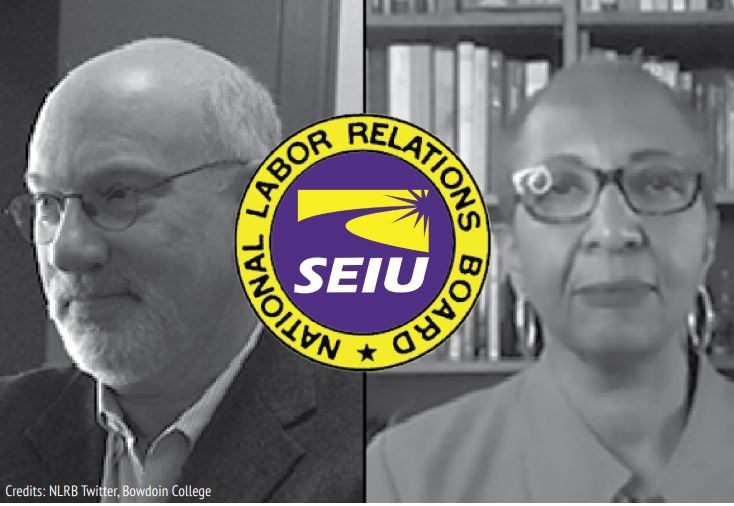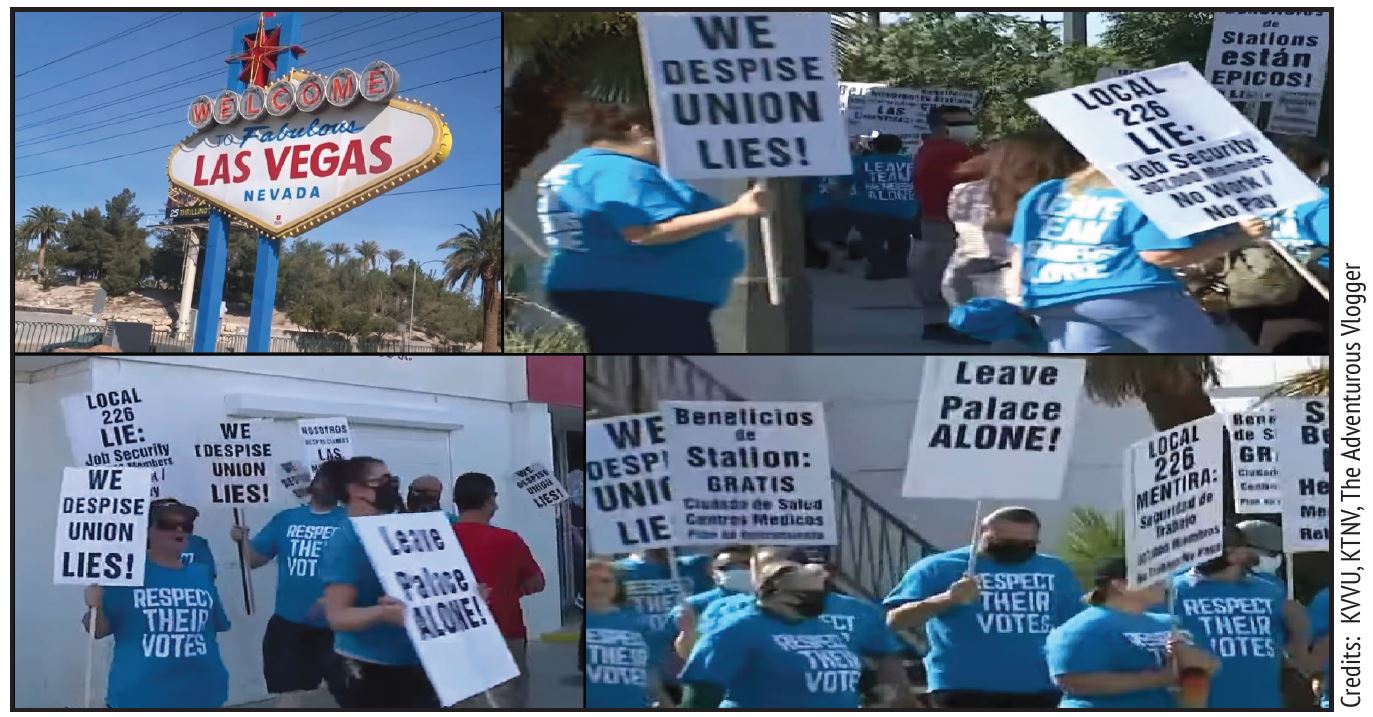Teamsters Union Bosses Back Down, Return Dues Illegally Seized for Politics to Long Beach Savage Services Workers
Settlement forces union officials to refund thousands to Savage Services employees, declare they won’t threaten those who refuse union membership
Los Angeles, CA (February 24, 2022) – Long Beach-area Savage Services employee Nelson Medina has won a settlement ordering Teamsters Local 848 union officials to pay back thousands of dollars in illegal dues they seized from about 60 of his coworkers who objected to union membership and to funding the union’s political activity. The settlement, won with free legal aid from National Right to Work Foundation attorneys, was approved by National Labor Relations Board (NLRB) Region 21 on February 14.
Because California lacks Right to Work protections, even private sector workers who oppose a union’s presence in their workplace can be required to pay union dues or fees to keep their jobs. However, under the Foundation-won CWA v. Beck U.S. Supreme Court decision, union officials can never require nonmembers to subsidize union political activity. Right to Work protections in 27 states so far ensure union membership and all union financial support are strictly voluntary.
Medina originally filed charges against Teamsters officials for illegal dues practices back in September 2021. The charges stated that he had sent Teamsters officials a letter on August 15 exercising his right to reject formal union membership. About a month after that letter, the charge noted, union officials informed Savage Services management by mail that if Medina and 12 fellow employees did not complete membership applications and pay full dues for the month of September, the employer should terminate the employees before September’s final week.
Medina’s August 2021 letter also demanded that union officials provide him his legal rights as a nonmember under the Foundation-won Beck Supreme Court decision. In addition to allowing workers to opt-out of funding union politics and other expenditures unrelated to the union’s bargaining functions, Beck also entitles nonmember workers to union financial disclosures.
The settlement, in addition to requiring Teamsters bosses to return nearly $6,000 in illegally taken dues to Savage Services employees, also mandates that union officials post a notice in the workplace. The notice declares that the union “will not fail to provide non-member employees with a breakdown of dues and fees required for Beck objectors upon request,” and that union bosses “will not threaten employees who have raised Beck objections with termination for failing to complete a union application as a condition of employment.”
“That Teamsters Local 848 officials illegally siphoned money for politics from almost 60 Savage Services employees and threatened termination of those who dared to stand up for their rights demonstrates clearly that they prioritize power far above the employees they claim to ‘represent,” commented National Right to Work Foundation President Mark Mix. “Based on the sheer number of employees in Medina’s workplace who are receiving refunds as the result of this settlement, Teamsters officials apparently played fast and loose with the rights of all workers who objected to their agenda.”
“We will continue to stand by Medina in his struggle to ensure that Teamsters bosses’ coercive tricks do not subvert his and his fellow employees’ will and rights,” Mix added.
Last September, Foundation staff attorneys also aided Ventura, CA, Airgas employees in removing Teamsters Local 848 from their facility. After litigation that had lasted almost a year, as well as two submissions of petitions demonstrating a majority of workers at the plant wanted the Teamsters gone, union officials finally departed the plant. They did so just before the NLRB was slated to conduct a vote whether to remove the union at the plant, likely leaving to preempt an embarrassing rejection by the workers.
Worker Advocate Files Brief Defending North Carolina Law to Strengthen Farm Workers’ Right to Work Protections
National Right to Work Foundation Legal Brief Counters Farm Union Bosses’ Case Seeking Power to Impose Union, Top Down, via Lawsuits
Richmond, VA (February 24, 2022) – The National Right to Work Legal Defense Foundation has filed an amicus curiae brief with the United States Fourth Circuit Court of Appeals in Farm Workers Organizing Committee v. Joshua Stein. This is a federal case brought by union officials seeking the power to impose monopoly union power and union dues deductions on agricultural workers and employers.
The brief defends a 2017 North Carolina law that bolsters farm workers’ Right to Work protections under the state’s longstanding and popular law. The 2017 law was passed to protect workers from having union monopoly representation foisted on them as a result of union-instigated lawsuits. The 2017 North Carolina law protects workers from union monopoly representation, the law also prevents union bosses from gaining the power to have union dues automatically deducted from agricultural workers’ paychecks.
Although they are private sector employees, agricultural workers are not covered by the National Relations Labor Act, which covers most private sector employees across the country. The Foundation brief argues this gives North Carolina the legal authority to prohibit union dues payroll deductions as a means of strengthening the existing protections of the state’s Right to Work law, which applies to agricultural workers in addition to those under NLRB jurisdiction.
The brief cites the fact that the Fourth Circuit Court of Appeals specifically rejected the argument that union officials have a right to payroll deduction in South Carolina Education Association v. Campbell. It also points out that the U.S. Supreme Court rejected union arguments that they had a right to payroll deductions for union political activities in Ysursa v. Pocatello Education Association.
The Foundation brief notes the Farm Labor Organizing Committee (FLOC) has “no more constitutional entitlement to have agricultural employers collect money for it than FLOC has a constitutional entitlement to having the state act as its collection agent.”
The Foundation brief further notes it is “well-established that prohibitions on collective bargaining do not infringe on union constitutional rights because unions have no constitutional entitlement to act as a monopoly bargaining representative.” It follows that North Carolina is well within its authority to protect workers and employers from being subjected to such monopoly “representation” through the misuse of litigation designed to sweep farmworkers under union control.
“Apparently union bosses have become so accustomed to their government-granted monopoly bargaining powers that they believe, incredibly, that the United States Constitution entitles them to impose monopoly unionization on workers unilaterally,” said National Right to Work Foundation President Mark Mix. “Although farm workers, like others, can of course associate with a union if they choose, FLOC union bosses should not be able to abuse the legal process to impose unionization on employees against their will.”
“It is entirely appropriate for North Carolina to protect agricultural workers against having a union imposed on them against their will,” added Mix. “Union association must be fully voluntary, not the result of backroom dealing in lawsuits by union officials designed to force a union on workers from the top down.”
Penske Truck Leasing Workers Petition To Remove Unpopular Teamsters Officials from Workplace
All but one worker sign petition seeking vote to remove union officials
BLOOMINGTON, IN (February 16, 2022) – Mechanics and customer service employees at Penske Truck Leasing in Bloomington, Indiana have filed a petition seeking the removal of the International Brotherhood of Teamsters Local Union No. 135 from their workplace. The workers’ decertification petition was filed with the National Labor Relations Board (NLRB) Region 25 office in Indianapolis, Indiana with free legal representation from National Right to Work Legal Defense Foundation staff attorneys.
Penske Truck Leasing employee Steven Stuttle filed the decertification petition for his coworkers who want to oust the unpopular union. Thirty percent of workers’ signatures are needed to trigger a NLRB-conducted secret ballot vote to remove the union. This request was signed by all but one of the workers in the bargaining unit.
Indiana is a Right to Work state, meaning workers cannot legally be required to join or pay money to a union as a condition of keeping their jobs. However, federal law permits workers to be forced under one-size-fits-all union monopoly “representation,” even nonmembers opposed to the union. If the workers’ decertification effort is successful, Teamsters union officials will be stripped of their monopoly “representation” powers.
National Right to Work Foundation staff attorneys have recently assisted workers in numerous successful decertification efforts across the nation, including for workers in Oklahoma, Illinois, and Delaware. Foundation-backed reforms to the rules for decertification elections that the NLRB adopted in 2020 have curtailed union officials’ abuse of so-called “blocking charges” to delay or block workers from exercising their right to decertify a union. Such charges are often based on unproven allegations made against an employer, completely unrelated to workers’ desire to free themselves of the union.
“If Teamsters union officials don’t take a hint and leave, the NLRB must promptly schedule a vote and allow Penske Truck Leasing employees to exercise their right to remove unwanted union officials,” commented National Right to Work Foundation President Mark Mix. “These workers are sending an overwhelming message that the Teamsters bosses are not Penske material.”
Chicago-area Firefighters Defend Right to Vote Out Unpopular Union from Spurious Union Boss Allegations
SEIU officials spin phony narrative about Village of Carpentersville officials to get state labor board to block employee election to remove union
Chicago, IL (February 11, 2022) – Village of Carpentersville firefighter Nick Salzmann is appealing an order by the executive director of the Illinois Labor Relations Board (ILRB) that blocks his and his coworkers’ right to remove unwanted union officials from their workplace. Salzmann, who filed a petition signed by his coworkers asking the ILRB to administer a vote among his colleagues whether to boot out Service Employees International Union (SEIU) Local 73 bosses, is receiving free legal aid from National Right to Work Legal Defense Foundation attorneys.
The ILRB is the Illinois state agency responsible for adjudicating workplace disputes among union officials, Illinois government agencies, and Illinois public employees. SEIU union officials filed so-called “blocking charges” in an attempt to stop the employee-requested vote, arguing that various allegations they are making against Carpentersville government officials should block Salzmann and his colleagues’ effort to oust the union.
While the ILRB executive director delayed the election at the union bosses’ behest, Salzmann’s appeal exposes numerous errors with the basis for that decision and uncovers an ongoing campaign by union officials to stop the decertification attempt.
Salzmann’s appeal brief reveals that, even though SEIU union lawyers convinced the ILRB that Carpentersville officials were not following proper bargaining procedures, in reality “the Union walked from the bargaining table twice.” Furthermore, the brief maintains that “the union walked away from the bargaining table twice when the Employer could not guarantee that the decertification process would not proceed,” a sign that SEIU bosses wanted Carpentersville officials to assist the union in quashing the employee-led decertification effort. According to the brief, approximately 80% of the firefighters favor decertifying the union.
The brief also states that “the Union amended the charges, changing from an ‘impacts and effect’ charge to a ‘failure to bargain’ charge,” a strong suggestion that union lawyers can’t demonstrate any connection between Salzmann and his coworkers’ desire to eliminate the union and anything Carpentersville officials did.
Finally, Salzmann’s brief contends that the SEIU bosses’ actions disturbed the “laboratory conditions” that should be present for any decertification election. It states that the “Union’s efforts to compel [the firefighters] to abandon their claim, including telling them they had proceeded improperly in their effort,” along with the union bosses’ willful departures from the bargaining table “caused the factual scenario” that led to the union’s charge.
“Despite the clearly misguided ILRB Executive Director’s order blocking the election, evidence is rapidly emerging about the tall tale SEIU bosses spun to avoid facing a vote of the rank-and-file workers they claim to ‘represent,’” commented National Right to Work Foundation President Mark Mix. “That union officials created the very circumstances that they are decrying in their so-called ‘blocking charges’ against Carpentersville officials is ridiculous. But the real injustice is that the ILRB is allowing union officials to abuse the process to stifle the will of the overwhelming majority of these firefighters, who support decertifying the union.”
Elsewhere in Illinois, Foundation staff attorneys are aiding Galesburg paramedics and EMTs in their effort to decertify an unwanted Teamsters union in their workplace. If successful, the effort would be the latest of several efficacious Foundation-backed employee removals of Teamsters officials in the past year.
White Plains Hospital Workers Seek Vote to Remove Unpopular SEIU 1199 Union from Workplace
Federal law gives rank-and-file workers the right to vote to free themselves from unwanted union “representation”
WHITE PLAINS, NY (February 10, 2022) – Healthcare workers at the White Plains Hospital in White Plains, New York have filed a petition seeking the removal of the Service Employees International Union (SEIU) Local 1199 union from their workplace. The workers’ decertification petition was filed with the National Labor Relations Board (NLRB) Region 2 office in New York, NY with free legal representation from National Right to Work Legal Defense Foundation staff attorneys.
White Plains Hospital Certified Surgical Technologist Yanilda Robinson filed the decertification petition for her coworkers who want to oust the unpopular union. The request seeking to end SEIU union officials’ monopoly bargaining powers at White Plains Hospital was signed by enough workers in the bargaining unit to trigger a NLRB-conducted secret ballot vote to remove the union.
New York is not a Right to Work state, meaning workers can legally be required to join or pay dues/ fees to a union as a condition of keeping their jobs. If the workers’ vote is successful, SEIU union officials will be stripped of their monopoly “representation” powers.
National Right to Work Foundation staff attorneys have recently assisted workers in numerous successful decertification efforts across the nation, including for workers in Kansas, Illinois, Massachusetts, and Delaware. Reforms to the rules for decertification elections that the NLRB adopted in 2020 have curtailed union officials’ abuse of so-called “blocking charges” to delay or block workers from exercising their right to decertify a union. Such charges are often based on unproven allegations made against an employer, often completely unrelated to workers’ desire to free themselves of the union.
“These healthcare workers have bravely worked over the past two years under exceptionally challenging circumstances. We should honor that devotion by respecting their right to remove an unwanted union from their workplace,” commented National Right to Work Foundation President Mark Mix. “We hope the NLRB will promptly schedule a vote and not allow SEIU officials to engage in legal trickery to delay the decertification election these hospital workers have requested.”











